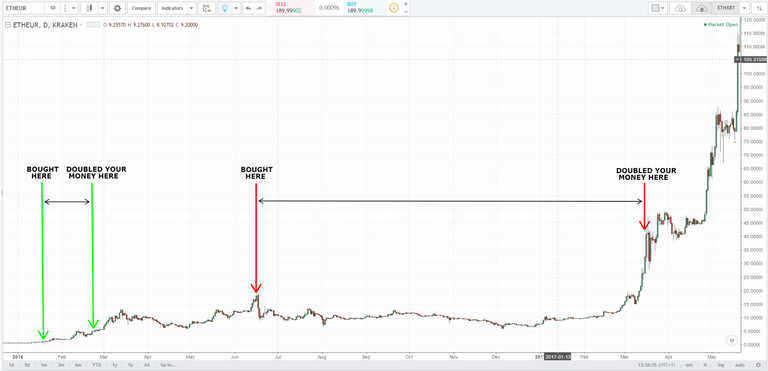The other day I had an interesting conversation with a friend who's recently been getting into cryptocurrencies. We had already spoken about how trustless consensus works, how currency is but one application of blockchain technology and how we're likely to see it spilling into many areas of human life as the Internet is transformed into a more decentralised, peer-to-peer environment.
I had been extremely conservative in “selling” it to him. I repeatedly emphasised how risky it is, how there are threats from all angles, whether it's the big public bullseye each successful crypto project represents for hackers everywhere, or a situation in which another crypto project makes your investment obsolete, or a scenario where governments suddenly decide to regulate cryptocurrencies into oblivion. He understood all this but still couldn't resist asking the burning question that's on everybody's lips…

How long until I double my money?
My facial expression must have changed involuntarily because he quickly tried to take the question back. I quickly said “no, no, no, it's a good one” and proceeded to pull my laptop out to show him a chart I'd been studying.
“This is a daily chart for the ethereum currency, ether,” I said, “it goes all the way back to 2015. I think it's the perfect way to show you what an impossible question you're asking me. Okay, so if you had bought ETH in February of 2015, as you can see, it would've taken approximately a month to double your money.”
He nodded.
“But look” I said, pointing further up the chart. “If you had bought here, at this peak in mid-June of 2016, it would've taken you a whole nine months to double your money.”
He nodded again, more vigorously this time.
“In June of 2015 the DAO hack happened. The price was spiking as all this ether was being locked up in the DAO smart contract. Then, when the news of the hack hit, poof, all that profit went up in smoke. So, if you were buying up that price rally, thinking ETH was going to the moon, you ended up having to hold for nine months before doubling your money and that's if you weren't spooked into selling.”
He smiled to let me know he understood.
Buy dips not bubbles
Dip-buying should be your default strategy when entering a market, especially with something as fast-moving as crypto. With bitcoin it was even more pronounced than in the example above. If you bought that first big bubble in November/December of 2013, when the price surged from $700 - $1200, you would've had to wait three and a half years, until June of 2016, for Bitcoin to even touch $700 again and until February of 2017 for it to hit $1200.
And it isn't just a cryptocurrency phenomenon. It happens everywhere. If you buy a house at the height of a property bubble, it can take a decade for you to even break even. If you buy it during a recession though, when that next boom cycle hits you could be laughing all the way to the real estate agent.
It's easier said than done though. Sitting there staring as the thing you want to buy climbs out of your reach. Also, when markets go parabolic like ETH recently has (I couldn't even fit the current price into the screenshot it's risen so much), you can miss out on potential profits by waiting for dips.
However, every single price spike looks like the last train to the moon when it's happening now, which is why so many people let greed get the better of them and are suckered into pump n dumps. Being able to wait for those dips takes a patience and strength of character that I promise will serve you in trading as well as in your life. It's kind of the ultimate anti-FOMO move. Try it.
A nice post
Thanks very much. Gonna check your stuff out as soon as I'm done with these replies. All the best!
Studying of the potential investment and "Dip-buying" as you say, should be a basic knowledge of anyone who wants to invest into stocks, ETFs, forex, or even cryptocurrencies.
Agreed! It gets the best of us humans though, you see a big green candle and spaz out. Just wanted to share the idea with people so they can hopefully avoid making mistakes.
If traders can learn this concept, they are half way there to being successful traders. Buying the peaks does not make for profitable trading...simple yet sometimes hard to execute for the novice.
Totally! Even more experienced traders get caught out like this. If the article saves one person from buying at the top then it was worth it IMO.
Congratulations @failbetter! You have completed some achievement on Steemit and have been rewarded with new badge(s) :
Click on any badge to view your own Board of Honnor on SteemitBoard.
For more information about SteemitBoard, click here
If you no longer want to receive notifications, reply to this comment with the word
STOPBy upvoting this notification, you can help all Steemit users. Learn how here!